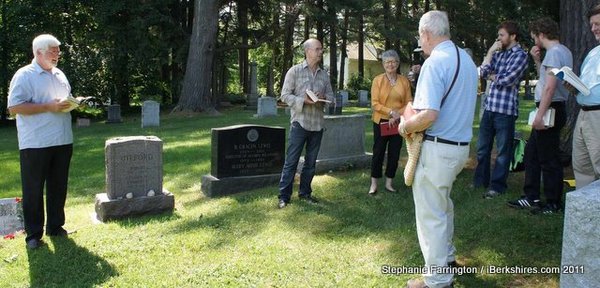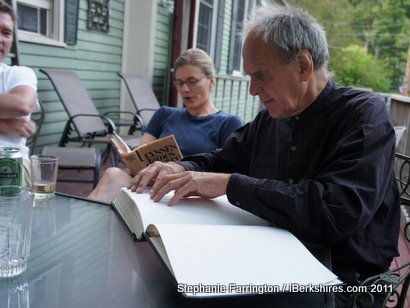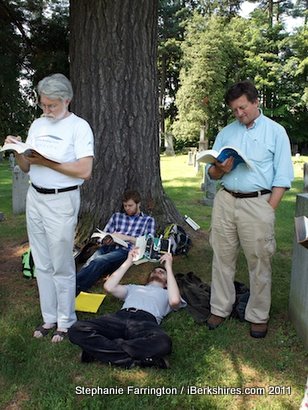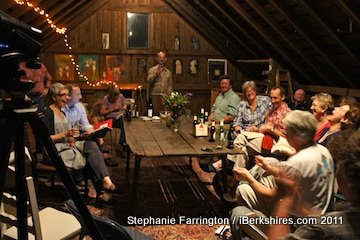
Reading Group Creates Williamstown Bloomsday
 Edward Snyder reads along in the Braille version of 'Ulysses' as the group takes turns reading from chapters on Wednesday night in preparation of Bloomsday. |
June 16 was Bloomsday, the annual celebration of James Joyce and his novel "Ulysses" that is named for the book's protagonist, Leopold Bloom. For the first time ever, Williamstown had its own celebration. The Ulysses reading group, formed by Karl Mullen and John Strachan, traveled from location to location, walking through town just as Joyce's book wandered through a day in Dublin.
On the eve of the big day, Edward Snyder read his selection like Jack Nicholson. He looked and smiled like Jack Nicholson. He threw his head back and laughed out loud at the puns the others read as politely as though they were the evening news. (They may choose to play the straight man but Snyder is in it for the sly, smart humor of the thing.)
I know for sure Snyder is not Jack Nicholson traveling incognito because when Snyder goes out to read Joyce, he carries a binder instead of a book. In his other hand, he has a white cane. Snyder is blind; he reads from the Braille edition of "Ulysses."
At the reading on the night before the big day, Snyder says he has a question. "Is our object to read as much as we can, as quickly as we can?" "No," Ron Gallagher answers, "we vary in pace."
“Being a virgin — a Joyce virgin — I am just getting the flow of Joyce himself and there's so much to take in, I just want to go forward," Gallagher continued.
Snyder answers, "Being a Joyce virgin, let me offer you a meno pause."
Then the table erupted into laughter and another reader began his passage. Nobody slowed down for Snyder or anyone else but the point was taken. This is as close as the group gets to agonizing over the events of the day.
 Bloomsday can be traced to June 16, 1954, the 50th anniversary of the events in the novel. |
The event was planned to be simple. There are no last-minute check-lists being reviewed, no tasks were assigned for the next morning. The times and locations are set. Everyone who wants to participate will show up and read.
There's a Facebook page and the group members know where to go. There are posters all over town; that's enough. If people join in, they too will get a chance to read. If not, it's a way the group can celebrate Bloomsday together.
It's like a sing-along "Messiah" and that makes it a bit different from most Bloomsday celebrations.
Mullen went so far as to arrange for a lunch of gorgonzola sandwiches, (like the ones eaten in the book) at the Water Street Grill. These are not normally on the menu, and wouldn't be, especially in this way – they are British-style sandwiches, nothing but cheese and bread, no crusts. Everything was kept as close to the book as possible. Once lunch is over, the group will read from the "Lestrygonians" chapter of the book, in which Bloom has that same gorgonzola sandwich and a glass of red wine for lunch.
Similarly, other locations have meanings tied to the book. "Hades," the chapter about death, decay and burial, was read at the grave of Don Gifford, an eminent Joyce scholar and Williams professor who wrote "The Annotated Ulysses." Gifford, who died in 2000, is buried in the cemetery behind the college.
Other locations included Tunnel City Coffee, which hosted "Sirens" at 4 p.m. and Linear Park on the Green River, chosen as the setting for "Nausicaa" at 6:30 p.m.
The turnout was better than expected. That was apparent from the start when 28 people crowded into the Thompson Chapel Tower to read the chapter titled "Telemachus" at 8 a.m. on a Wednesday.
Mullen is optimistic, "In our third year, Bloomsday falls on a Saturday," he said. "We'll have time to build up to it and we'll have a really great turnout by then."
If the readers for the day were all as lively as Edward, it's a sure bet.
 By the end of the day, the group had settled into about 25 people, all gathered around a farm table in Mullen's studio, a converted barn. There was more beer, wine and food, this time provided by Deborah Gallagher, who runs a small catering buisness in town. The talk was lively and, as much fun as it was, you can tell the group was glad to be finished.
By the end of the day, the group had settled into about 25 people, all gathered around a farm table in Mullen's studio, a converted barn. There was more beer, wine and food, this time provided by Deborah Gallagher, who runs a small catering buisness in town. The talk was lively and, as much fun as it was, you can tell the group was glad to be finished. The event is for commemoration but most of all, it's fun. When the group starts up again in September, they plan to read a different author, maybe Beckett or Kerouac, but they will for sure continue with their new Bloomsday tradition. It was a rousing success.
At one point there were 50 people gathered around a table outside, reading Joyce in the late afternoon sun of a perfect June day.
If you missed Thursday's event, mark next year in your calendar, June 16, Bloomsday, in Williamstown. It's an authentic Bloomsday but quirky enough to make James Joyce tip a glass and smile.
Stephanie Farrington is a Canadian journalist who, taking a break in the Berkshires, can't seem to stop writing.
Tags: Bloomsday, book club,















